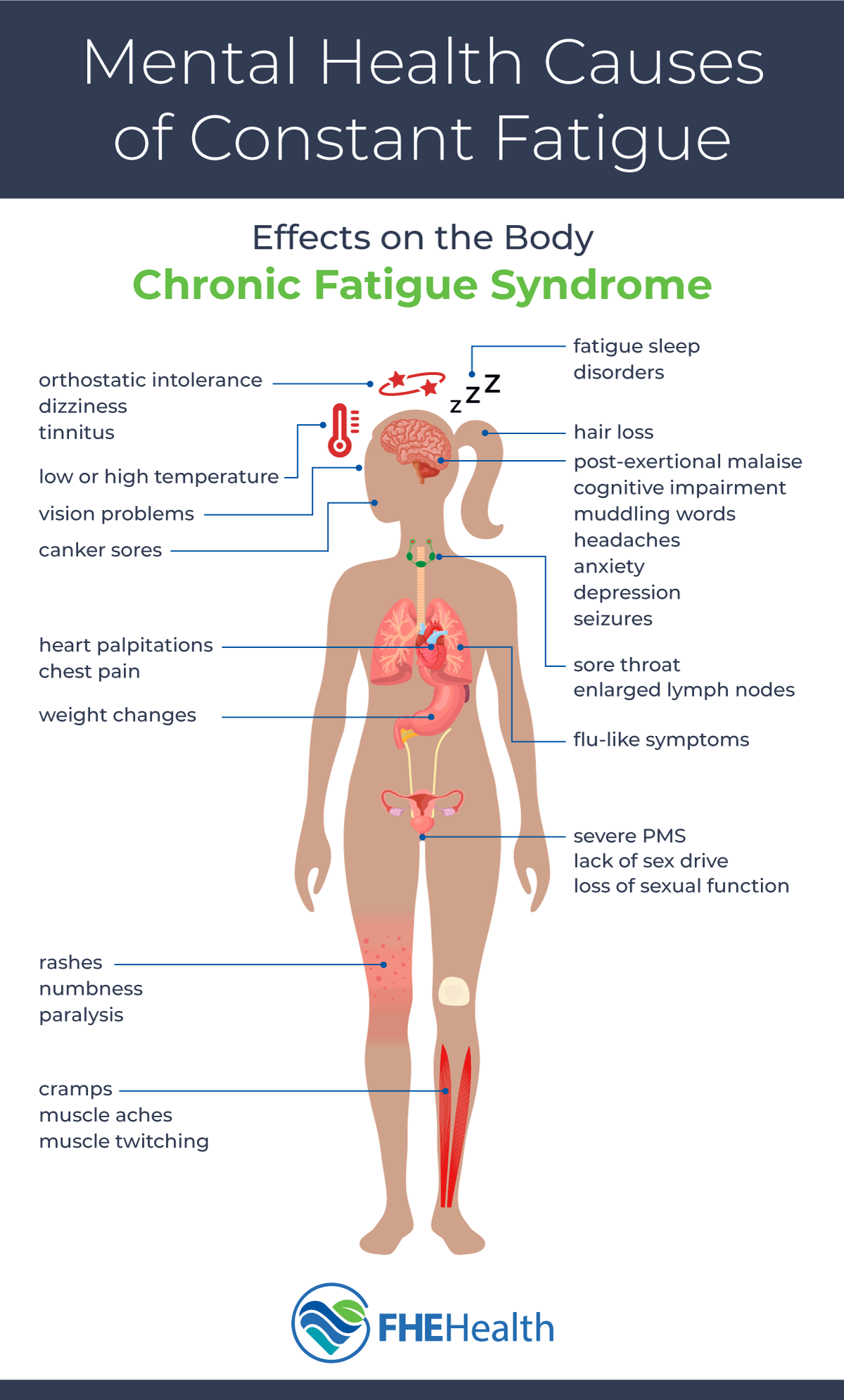
If you constantly feel exhausted and have no energy to do anything, you may be struggling with fatigue. It’s common for adults to experience fatigue at some point in their lives, and it can cause both physical and mental symptoms, making it difficult to focus at work or accomplish everyday tasks.
Fatigue is often linked to not getting enough sleep, but your mental health can also impact energy levels, causing you to feel more tired and less motivated. Understanding the connection between fatigue and mental health can help you determine the root cause of your low energy and find needed support.
Exploring the Connection Between Fatigue and Mental Health
Everyone feels tired at times, but when someone experiences fatigue, it means they’re severely overtired. You may feel an overwhelming urge to sleep but never feel refreshed after resting, making it difficult to get up in the morning, go to work or simply make it through the day. Fatigue can cause various physical symptoms, including:
- Tired eyes
- Muscle pain and weakness
- Stiff shoulders or legs
- Whole body tiredness
- Discomfort or unease
- Headaches
- Dizziness
- Appetite loss
- Reduced immune system function
Fatigue can also cause psychological and emotional symptoms similar to certain mental health conditions. For example, you may have no energy to do anything or lack motivation to participate in activities you usually enjoy. Some people may feel nervous, anxious or irritable and have trouble concentrating on detail-oriented tasks or remembering things, a phenomenon also referred to as brain fog.
Many times, fatigue is linked to lifestyle factors, such as poor sleeping habits, not eating enough or lack of exercise. However, feeling too tired to do anything can also indicate an underlying mental health issue.
No Energy to Do Anything? 4 Common Mental Health Factors to Consider
If you don’t have energy to do anything, it may not be your fault. Fatigue is a symptom of many mental health conditions, and identifying and treating the underlying condition may raise your energy level and alleviate other related symptoms you’re experiencing. Here are a few mental health disorders commonly linked to fatigue.
Mood Disorders
Mood disorders, such as depression and bipolar disorder, are often accompanied by fatigue, sleep disturbances and erratic sleep-wake cycles. Some people may struggle to fall and stay asleep, while others may constantly oversleep and wake up feeling sluggish. Depression fatigue is particularly common, with a study from 2018 reporting over 90% of patients with major depressive disorder experiencing it as a symptom.
Stress
Stress is a common culprit of sleepless nights, whether it’s related to work, relationships or finances. Most people have spent a night tossing and turning from stress, but chronic stress can cause an endless cycle of disturbed sleep and low energy, triggering feelings of depression and anxiety. Some people may also begin stressing about not getting enough sleep, making it even more difficult to relax at night.
Anxiety
Anxiety disorders, including generalized anxiety disorder, obsessive-compulsive disorder and post-traumatic stress disorder, are often associated with fatigue and sleep disturbances. As with stress, sleep deprivation can trigger anxiety, perpetuating a cycle of anxious feelings and lack of sleep that’s difficult to break, and can exacerbate both conditions.
Attention Deficit Hyperactivity Disorder (ADHD)
ADHD symptoms, including hyperactivity, anxiety and sleep issues, can cause fatigue, especially in adults, impacting their overall mood and ability to function. One study found that 62% of adults with ADHD reported feeling significantly more fatigued than those without the condition. Many medications used to treat ADHD can also impact sleep and energy levels, since stimulants can cause tiredness as they wear off throughout the day.
How Chronic Fatigue Can Impact Your Overall Well-Being
Sleep is a necessity, not a luxury you can afford to go without. Chronic fatigue lasting for months or years can adversely affect your overall physical and mental well-being, making you more susceptible to getting sick or developing mood problems. It can also lower alertness and concentration, increasing the risk of injury from accidents due to falling asleep while driving or mismanaging heavy machinery or equipment at work.
Because fatigue can make it harder to focus or remember things, it may lower your productivity level at work, putting your job and finances at risk. Lack of motivation and impaired judgment from fatigue can also make you apathetic toward your job, leading to missing work or failing to fulfill job responsibilities.
Additionally, if you have no energy or motivation, you may neglect personal hygiene or struggle to engage in self-care activities, such as exercising, journaling or taking walks. These factors combined can also negatively affect your mental health, making it even harder to cope with fatigue.
Coping Strategies for Mental Health-Related Fatigue
Mental health-related fatigue can often be alleviated by treating the underlying mental health issue. Establishing healthy coping strategies you can turn to when you’re feeling stressed, anxious or depressed can improve your mood, making it easier to relax and fall asleep. A few strategies to consider include:
- Exercising. Moving around may be the last thing you want to do when tired, but regular exercise can boost your energy level, making you less tired in the long run. Start with short 15-minute intervals and increase the length and intensity of your workouts as your body adjusts.
- Eating regularly. Consuming small meals and healthy snacks every 3 to 4 hours rather than having larger meals less frequently can help you maintain energy throughout the day.
- Reducing stress. Engaging in relaxing activities, such as yoga, reading or listening to music, can reduce stress and make you feel calmer, which may help you sleep better.
- Building a support system. Having close friends or family to confide in can alleviate feelings of anxiety, stress or depression. You might also consider therapy or counseling to understand where these feelings are coming from and how to cope with them.
Professional Treatment Can Help
Fatigue can seriously impact your daily functioning and quality of life, but help is available. At FHE Health, our trained counselors can help you uncover any mental health issues affecting your sleep and develop healthy coping strategies to improve your overall well-being. Contact us today and take the first step toward getting the support you need.







